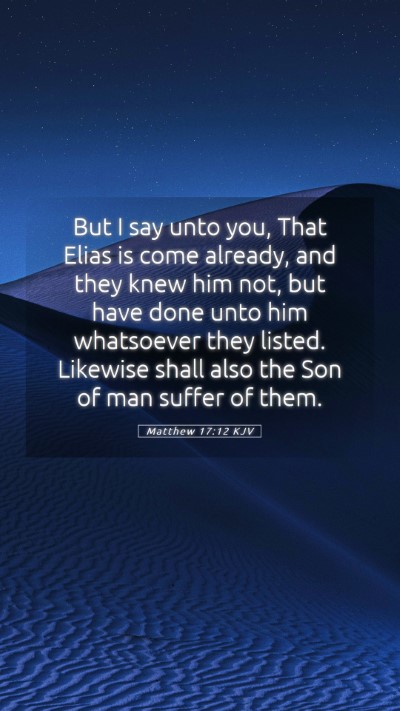Bible Verse Meaning: Matthew 17:12
Verse: Matthew 17:12 - "But I say unto you, That Elias is come already, and they knew him not, but have done unto him whatsoever they listed: likewise shall also the Son of man suffer of them."
Summary and Analysis
This statement by Jesus pertains to the prophetic role of Elijah, reflecting both past and future themes. In this verse, Jesus identifies John the Baptist as the fulfillment of Elijah’s prophecy, as indicated in the Scriptures. The commentary by Matthew Henry emphasizes the duty of discernment among the people concerning the coming of the Messiah and the preceding messenger, John the Baptist.
Contextual Background
In the context of this passage, Jesus has just revealed His divine authority and His impending suffering. The mention of Elijah is significant as it aligns with Old Testament prophecies regarding the forerunner to the Messiah, which can be referenced in Malachi 4:5. Jesus underlines that despite John’s vital role, he was not recognized by the people. This reflects a broader theme of rejection faced by both John and ultimately Jesus Himself.
Commentary Insights
- Matthew Henry: Henry notes that the rejection of Elijah (John the Baptist) showcases humanity's failure to recognize divine messengers. He draws attention to the consequence of disbelief and the inevitability of suffering, which is modeled in both Elijah’s story and that of Christ.
- Albert Barnes: Barnes expounds on the implication that John the Baptist's ministry serves as a testament to Jesus's identity. The lack of recognition signifies a spiritual blindness that persists in the hearts of many, demonstrating a theme of unawareness when divine truth is presented.
- Adam Clarke: Clarke elaborates on the prophetic nature of this verse and categorizes John’s role as the conduit of prophecy, effectively communicating God’s message before the arrival of Jesus. Clarke emphasizes the historical context and what this meant for the Jewish audience who were expecting a triumphant Messiah.
Theological Reflections
Through this verse, we are reminded of the greater theme within Scripture concerning the rejection of prophets and God's messengers. It prompts readers to reflect upon the continual need for awareness and acknowledgment of God’s active role in history. This theme resonates throughout the New Testament and invites deeper bible study insights into the nature of human reception towards divine revelation.
Application to Daily Life
Understanding this verse can lead to practical implications for Bible study groups and online Bible study. It encourages believers to seek a deeper understanding of how they receive God's messages in their lives and remain vigilant against spiritual apathy or disbelief.
Cross References
- Malachi 4:5: Reference to Elijah's coming as a forerunner.
- Luke 1:17: Describes John the Baptist as going before the Lord in the spirit and power of Elijah.
- Matthew 11:14: Jesus explicitly identifies John the Baptist as Elijah.
- Mark 9:12: Affirms Jesus's teaching on Elijah's coming and its fulfillment.
- Revelation 11:3-6: The two witnesses, often associated with Moses and Elijah, representing prophetic voices in the end times.
Conclusion
Matthew 17:12 provides a profound Bible verse interpretation that addresses recognition and rejection of God's messengers, fosters awareness surrounding spiritual blindness, and underscores the prophetic nature of John’s ministry. For those seeking to enhance their Bible study materials and resources, this verse serves as a foundational text for exploring the themes of prophecy, recognition, and God's redemptive plan through Jesus Christ.


